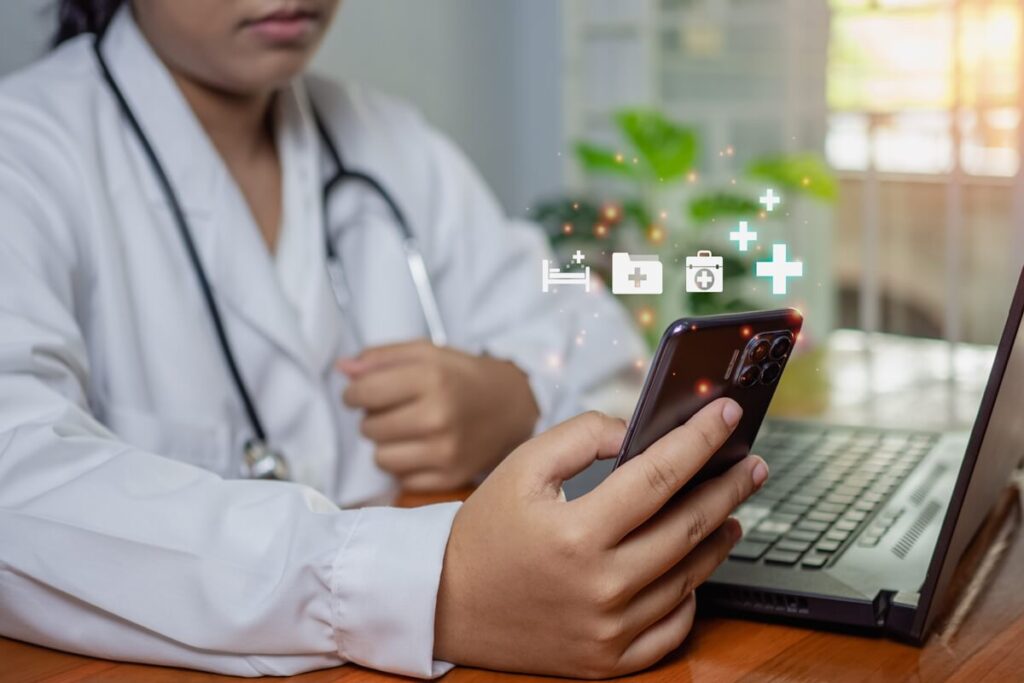In the burgeoning field of Healthcare Mobile App Development, the landscape of patient care and healthcare management is undergoing a significant transformation. The development and integration of healthcare apps into the medical ecosystem are not just trends but are becoming essential tools in revolutionizing patient care. Apps span a broad spectrum, including telemedicine, health monitoring, wellness and fitness, and medication reminders, each playing a pivotal role in enhancing the healthcare experience for patients and providers alike.
The Surge of Healthcare Mobile Apps
The Healthcare Mobile App Development sector has seen an unprecedented surge in recent years, buoyed by the increasing reliance of patients and healthcare providers on digital solutions. Statistics reveal a marked increase in the usage of healthcare apps, with a sizeable percentage of both patients and practitioners turning to mobile solutions for health monitoring, telemedicine services, wellness tracking, and medication management. This uptick is indicative of a broader digital transformation within the healthcare industry, transforming the way care is accessed and delivered.
Types of Healthcare Apps Making an Impact
- Telemedicine: Offering remote consultations and reducing the need for in-person visits.
- Health Monitoring: Enabling real-time tracking of vital signs and health conditions.
- Wellness and Fitness: Promoting healthy lifestyles through exercise and nutrition tracking.
- Medication Reminders: Helping patients adhere to their medication schedules.
Core Features of Successful Healthcare Mobile Apps
To stand out in the crowded healthcare app market, developers must incorporate essential features that cater to the needs of both patients and providers. Some key elements include:
- User-friendly Interface: The importance of intuitive and easy navigation cannot be overstated, ensuring that both patients and doctors can efficiently use the app without technical hurdles.
- Data Security and Compliance: Crucial adherence to regulatory standards such as HIPAA is essential in safeguarding patient information against breaches, thereby fostering trust in mobile healthcare solutions.
- Integration Capabilities: Successful healthcare apps seamlessly sync with existing medical records and healthcare systems, providing a cohesive and comprehensive view of the patient’s health history.
- Remote Monitoring and Telehealth Services: These features are at the forefront of enhancing patient care, allowing for continuous monitoring and convenient access to healthcare professionals, thereby significantly improving healthcare outcomes.
By focusing on these core aspects, Healthcare Mobile App Development continues to evolve, empowering users and providers alike with tools that are not only innovative but also critical in achieving a more efficient, accessible, and high-quality healthcare system.
Overcoming Challenges in Healthcare App Development
One of the primary hurdles in Healthcare Mobile App Development involves ensuring the utmost data privacy and security. Developers must design apps that not only adhere to rigorous standards like HIPAA but also implement advanced encryption technologies to safeguard patient information against cyber threats. Another significant challenge is ensuring the widespread accessibility of these mobile solutions across diverse populations, including those with limited tech proficiency or in underserved regions. Strategies to encourage the adoption of these technologies include simplifying the user experience, providing multilingual support, and incorporating educational elements to demystify the functionalities of the app for both patients and healthcare providers. Additionally, Healthcare Mobile App Development teams must continuously monitor and update their apps to keep up with the rapidly evolving healthcare landscape and changing regulatory requirements.
Future Trends in Healthcare Mobile App Development
The horizon of Mobile app development for businesses in the healthcare sector is rapidly expanding, with Artificial Intelligence (AI) and Machine Learning (ML) at the forefront, personalizing patient care and offering predictive insights into health trends. Blockchain technology is emerging as a groundbreaking solution for enhancing the security and integrity of health data, ensuring transparency and trust in how patient information is stored and shared. Furthermore, the integration of wearable technology continues to deepen, providing seamless, continuous monitoring of vital signs and health markers, thus extending the capabilities of healthcare apps beyond traditional confines.
Virtual Reality (VR) and Augmented Reality (AR) are also paving innovative paths in patient education and treatment planning, offering immersive experiences that could revolutionize the way we understand and interact with our health. As the healthcare industry continues to embrace technological advancements, it is crucial that mobile app developers keep up with these trends to deliver cutting-edge solutions that optimize patient care and experience. Lastly, regulatory compliance around health data privacy and security will become increasingly complex, necessitating stringent measures in the development of healthcare mobile apps.
The Role of Rust
Rust is a modern programming language that offers many benefits for developing mobile apps, including improved performance, memory safety, and concurrency. These features are crucial in building robust and secure healthcare apps that handle sensitive patient data. Additionally, Rust’s compatibility with various platforms and its active community support makes it an attractive choice for app developers. Its strictness in code compilation also ensures that healthcare apps are free from bugs and vulnerabilities, reducing the risk of data breaches.
With the increasing demand for healthcare apps, there is also a growing need for specialized skills in developing these apps. Learning Rust can provide developers with a competitive edge in the rapidly evolving field of healthcare technology. Its unique features and focus on security make it a valuable tool for creating efficient and secure healthcare apps.
Conclusion
Using mobile apps in healthcare can revolutionize healthcare delivery, improving access, efficiency, and patient outcomes. While there are challenges to overcome, such as data privacy and accessibility concerns, there are also significant opportunities for collaboration and expansion in the global market. Rust’s role in developing secure and efficient healthcare apps makes it a valuable tool for app developers looking to enter this dynamic field. By staying up to date with the latest trends and advancements in healthcare technology, developers can play a crucial role in shaping the future of healthcare delivery. So, contact us today to learn more about how Rust can benefit your healthcare app development journey.
